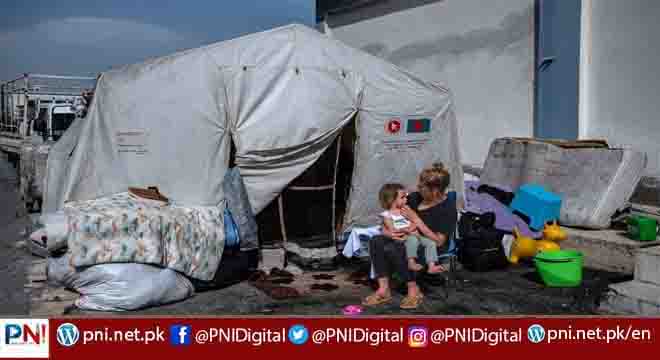Antakya, Turkey, May 14 (AFP/APP):The Simseks have spent months huddling in tents next to their old home, laid to waste by Turkey’s catastrophic quake.
How they vote Sunday could prove decisive to President Recep Tayyip Erdogan’s future.
Amid the wreckage of ancient Antakya, a mountain-rimmed cradle of civilisation on Turkey’s border with Syria, grandfather Suphi Simsek, his daughter-in-law Dilber and granddaughter Ozlem all intend to cast ballots.
“Voting in the middle of the rubble isn’t a joyful experience but we want the government to change,” said Dilber, her sleeves rolled up while she scrubbed a cooking pot.
“Look, it’s been three months and nothing has changed! They want to make us pay taxes for our building, where we can’t live anymore,” she told AFP.
The 48-year-old mother hinted that she would back Kemal Kilicdaroglu, the secular opposition leader who is primed to break Erdogan’s 21-year grip on power in the knife-edge vote.
– Democracy amid destruction –
The damage inflicted by the 7.8-magnitude tremor that struck southeastern Turkey on February 6 has left much of Antakya unrecognisable.
Row upon row of dilapidated buildings, long emptied of their inhabitants, pile up, giving Antakya the air of a ghost town.
Hundreds of other structures were completely erased, with only a tangled mess of crushed plastic, bent metal strips and the odd concrete slab left behind.
More than 50,000 earthquake victims have been identified in Turkey, but the real figure is believed to be higher, while an estimated three million people were internally displaced.
The authorities have had to improvise to hold the elections. Neither Erdogan nor his rival held formal campaign rallies in Antakya’s Hatay province after the quake.
Some 167 containers have been transported to Antakya and some of its suburbs in recent days to provide polling booths for tens of thousands of voters, with many schools usually used as polling centres damaged or destroyed.
Buses have been flocking to Antakya to transport displaced residents wanting to take part in the elections, with more than one million voters registered in Hatay province.
Posters bearing Kilicdaroglu’s face have been hung on bus stops and near roundabouts, but not a single Erdogan portrait could be seen.
Erdogan won a first-round victory in the last presidential election in 2018 but only took 48.5 percent of the vote in Hatay, four points below the national average.
– ‘We have to believe’ –
The government came under fierce criticism for its response to the disaster, and the president’s promise to swiftly rebuild 200,000 homes in Hatay rings hollow for Ozlem Simsek.
“Turkey has received loads of foreign donations, so why despite all that do I have to get into debt for my new home?” the 27-year-old said as she puffed on a cigarette.
Mehmet, a man in his 30s who lives with his wife in a tent near the Simseks, thinks Erdogan’s commitment to build homes is part of a “strategy” to deflect blame for his government’s initial failings.
Suphi also doubts whether Erdogan or Kilicdaroglu will be able to fulfil their pledges to rebuild Antakya.
“But we have to believe. No matter who wins, all we want is that our buildings and our city are reconstructed,” he told AFP in front of his tent.
Mehmet saw a positive side to election fever hitting Antakya after the trauma of the past three months.
“People are focused on the campaign, they’re not thinking about the rest,” said Mehmet, who declined to give his surname because “any kind of political comment can create problems in Turkey”.
“The elections are like the Olympic Games here, the excitement is stronger than the tragedy.”
Follow the PNI Facebook page for the latest news and updates.









